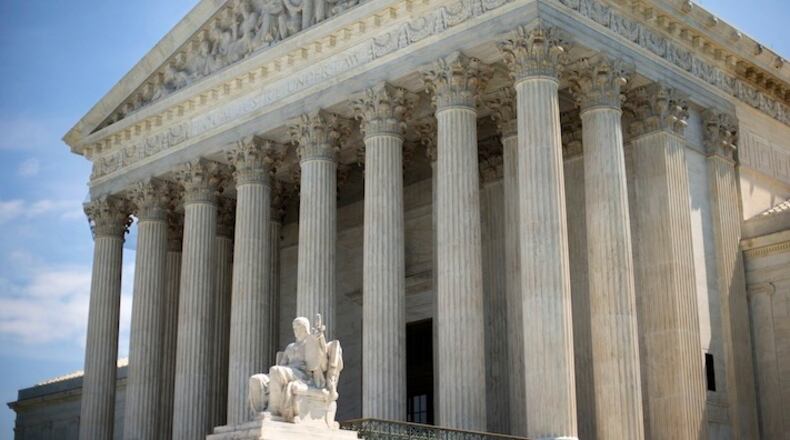The fight over filling the Supreme Court escalates this week when President Donald Trump announces his nominee to replace the late Justice Antonin Scalia.
With Trump's choices reputedly narrowed to two or three conservative appellate judges, the president has said he will announce the nominee Thursday. There's a distinct possibility of a leak before then, as lawmakers and interest groups appear ready for a confrontation that's been nearly a year in the making.
"I can already tip you off," Vice President Mike Pence told Republican lawmakers meeting in Philadelphia Thursday. "President Trump's going to keep his promise to the American people and he's going to nominate a strict constructionist to the Supreme Court."
One of the leading contenders, Denver-based Judge Neil Gorsuch of the 10th U.S. Circuit Court of Appeals, has praised Scalia as a "lion of the law." Scalia denied he was a strict constructionist, though the label often stuck.
A strict constructionist, as a general matter, holds that the Constitution's reach is limited to the document's literal text as it was written in 1789 or added to in subsequent amendments. It's also political shorthand that's particularly useful for those, like Trump and Pence, who are not lawyers.
"Unlike the previous president, I don't think this president is interested in the legal questions," Saikrishna Prakash, a professor at the University of Virginia School of Law, said during a panel discussion at the American Enterprise Institute in Washington. "This president came to office as a businessman ... (who) is going to rely on his lawyers" on certain legal issues.
Trump has said he's been helped identifying candidates by leaders of the conservative Heritage Foundation and Federalist Society. Some of the consultations have been informal, with attorneys in the White House counsel's office. Gut instinct and personal chemistry also count in judicial selections, as does a potential candidate's ability to navigate a president's sometimes unpredictable psychology.
Senate Republicans won the early rounds on replacing Scalia by refusing to consider a Democratic nominee for nearly 10 months last year. The extraordinary obstruction secured for Trump the power to make the lifetime appointment, though his eventual nominee will also face Senate Democrats still angry over the Republican treatment of President Barack Obama's nominee, Judge Merrick Garland of the U.S. District of Columbia circuit Court of Appeals.
Trump started marketing his eventual Supreme Court choice with two public lists, totaling 21 ostensible candidates. Some of the early names seemed floated primarily for political purposes, like the ego-stroking inclusion of Sen. Mike Lee, R-Utah. The initial lists included four women and, ethnically, one African-American, one Hispanic and one Asian-American.
Gorsuch and the other two reported finalists are middle-age white men who have conservative judicial credentials that would effectively retain the court's 5-4 rightward tilt during during Scalia's tenure.
At 49, Gorsuch is the youngest of the presumed finalists and his elite educational background most closely matches that of the current justices. Born in Denver, he earned his undergraduate degree from Columbia University, his law degree from Harvard and a doctorate in legal philosophy from Oxford University.
Gorsuch's conservative views on issues including the death penalty, religious liberty and the Second Amendment have largely echoed Scalia's positions. He is, however, less controversial than at least one other finalist, and he won confirmation to his current seat by a 95-0 vote.
A more incendiary choice, by far, would be Judge William H. Pryor Jr., 54, of the 11th U.S. Circuit Court of Appeals. Pryor once denounced the Supreme Court's 1973 Roe v. Wade decision upholding the right to an abortion as the creation "out of thin air of a constitutional right to murder an unborn child" and as "the worst abomination in the history of constitutional law."
Pryor had to fight his way to confirmation to his current seat, finally winning on a 53-45 Senate vote.
A third top contender, Judge Thomas Hardiman, 51, of the 3rd U.S. Circuit Court of Appeals, is a 51-year-old, Spanish-speaking conservative who has been vocal on Second Amendment rights, generally unsympathetic to death row inmates and mostly silent on abortion. He has also had, until recently, a relatively low profile.
The new justice will enable the court to avoid the 4-4 deadlocks that have stymied definitive statements on some pressing issues. These ties uphold lower appellate court rulings without setting national precedent.
About the Author
Keep Reading
The Latest
Featured



